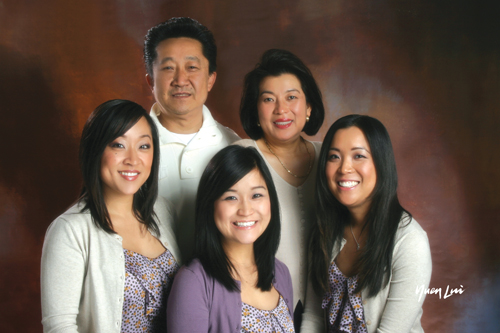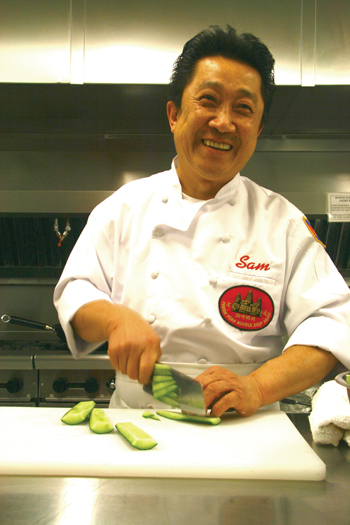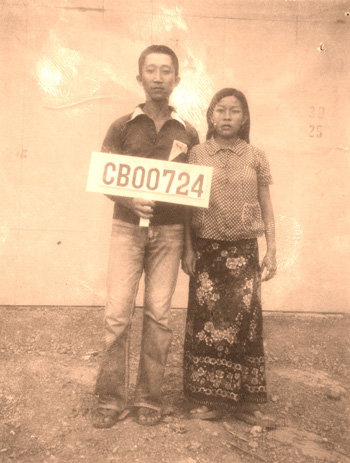
From left to right, top to bottom: Sam Ung, Kim (wife), and daughters Dawn, Diane, and Darlene
 Top: Phnom Penh Noodle House owner and chef Sam Ung (Photo courtesy of Thomas McElroy)
Top: Phnom Penh Noodle House owner and chef Sam Ung (Photo courtesy of Thomas McElroy) Bottom: Sam Ung and wife, Kim, in Khao-I-Dang refugee camp in Thailand. (Photo from Sam Ung)
Bottom: Sam Ung and wife, Kim, in Khao-I-Dang refugee camp in Thailand. (Photo from Sam Ung)Posted on 16 June 2011
Tags: 2011, I Survived the Killing Fields, Sam Ung, Thomas McElroy, Vol 30 No 25 | June 18 - June 24
By Irfan Shariff
Northwest Asian Weekly
Sam (Seng) Ung and Thomas McElroy have known each other for 15 years. They were neighbors in the same South Seattle neighborhood. Ung introduced himself to McElroy’s dog in Chinese. McElroy knew then, as his dog listened patiently to Ung, that this would be a long-lasting friendship.
Over the years, Ung, his wife, and three daughters became like family to McElroy and his wife. Although no longer neighbors, their bond has only strengthened.
In 2009, Ung and McElroy embarked on a journey to write Ung’s memoir, “I Survived the Killing Fields: The True Life Story of a Cambodia Refugee,” which was published earlier this year.
“It was my first dream,” said Ung. Since 1980, when he arrived in Seattle, he had wanted to write about his history so that future generations would know what happened to him and other Cambodians.
“[Until] the book came out, even the kids (Ung’s daughters) had no idea what their dad had been through,” said McElroy. “You don’t talk about those things.” McElroy noticed the same thing about other Cambodian refugees.
Since 1987, Ung has been the owner of the Phnom Penh Noodle House in the International District, where he works every day, except Wednesdays. The restaurant specializes in the cuisine of Ung’s native Cambodia, Phnom Penh being its largest city and capital.
The past
Ung, however, grew up in Battambang, the country’s second largest city, located almost 200 hundred miles northwest of Phnom Penh. His father owned a successful noodle house and raised Ung and his nine siblings in a comfortable, yet very hardworking household until 1975, when the Khmer Rouge regime took control of Cambodia.
The term Khmer refers to the main ethnic group in Cambodia, or ethnic Cambodians. Rouge, French for “red,” connotes the Communist leanings of the regime. Ung and his family were of ethnic Chinese descent and a key target of the Khmer Rouge, which aimed to clear Cambodia of outsiders.
“The Khmer Rouge stopped the economy dead in its tracks in three days,” said McElroy, who was asked by Ung to help write his story. “It was a total cultural devastation.”
The book describes the process by which families and populations were uprooted from their cities and villages to work the Killing Fields, where Cambodians were killed or worked to death.
“They were trying to build a truly agrarian society,” said McElroy, who estimates that up to 3.5 million Cambodians were directly or indirectly killed by their own government.
The book
“I Survived the Killing Fields” is both Ung’s and McElroy’s first book.
Ung knows several languages, but English isn’t his strongest. Although coming from an educated family, Ung’s formal schooling was cut short because he was needed to help at his father’s restaurant.
“He was more of the street-wise brother,” said McElroy. “Street-wise people can make things happen.”
McElroy, who holds degrees in both music and computer science, put the words behind Ung’s emotions. Every Wednesday, when the restaurant was closed, McElroy and Ung would meet to write.
The 25-month process was “also a growth experience for me,” McElroy said. “We went through 30 versions.”
The process would later take them both to Cambodia.
During their meetings, McElroy would record Ung as he remembered his past. He would then formulate those memories into the story and match them, for a backdrop, with the corresponding historical events that plagued the country.
“It was hard to write. Sam would start crying, then I’d lose it,” said McElroy.
“My head is full,” Ung would tell him. Sometimes, Ung would call McElroy late at night as he remembered new details.
“I feel proud about what I have done,” says Ung. “A lot of people believe that since these events are in the past, it doesn’t need to be brought up again,” said Ung. “It has passed, but it stays inside.”
Dani Morton, a volunteer and community activist from Shoreline, is glad that Ung shared his story.
Morton also experienced the Killing Fields, where her father was killed.
“It was very courageous of him to write this. The majority of us are crippled,” she says. “We have the experience of not talking to anyone because of fear of torture.”
Ung’s book emphasizes the level of paranoia among the Cambodians during the time. Morton believes this fear continued as refugees came to the United States. Morton advocates for Cambodian American health issues at the national level.
“Because of the war, the majority of Cambodian Americans have tremendous hardship, both physical and psychological,” she says.
The Cambodian community
The community in Seattle ranks third in the country after cities in California and Massachusetts.
Cambodian Americans in Seattle, however, are both socially and linguistically isolated, said Morton.
“We continue to face many challenges from becoming fully integrated into American society,” she said.
“Even after three decades, we can’t get back up because of the experiences we had.”
Ung’s story is also that of living out his dream and succeeding. He wants to tell the world about a country whose history is sometimes forgotten.
“The American consciousness was fixated on Vietnam, and Cambodia got kind of lost,” said McElroy.
“There was awareness, but not enough.”
Morton also recalls an incident where she met an American professor who had never met a Cambodian before. The professor had heard about the war, but he didn’t know how badly it had affected the Cambodian people.
“His experience is similar to the rest of us,” said Morton. “With this story, we all have a responsibility to tell the world.”
“I never forget who I am and where I come from,” said Ung, who hopes his book will help others tell their stories.
“I Survived the Killing Fields” was published by S & T Publishing, a joint venture between Ung and McElroy. They hope to issue a second edition of the book that incorporates more details from Ung’s brothers, as well as an anthology of writings from other survivors.
Ung will be available for book signings at the Wing Luke Museum on June 18, July 16, Aug. 20, and he will do a reading on Sept. 17. ♦
To purchase “I Survived the Killings Fields,” visit the Marketplace at the Wing Luke Museum or Phnom Penh Noodle House.
Irfan Shariff can be reached at info@nwasianweekly.com.

No comments:
Post a Comment